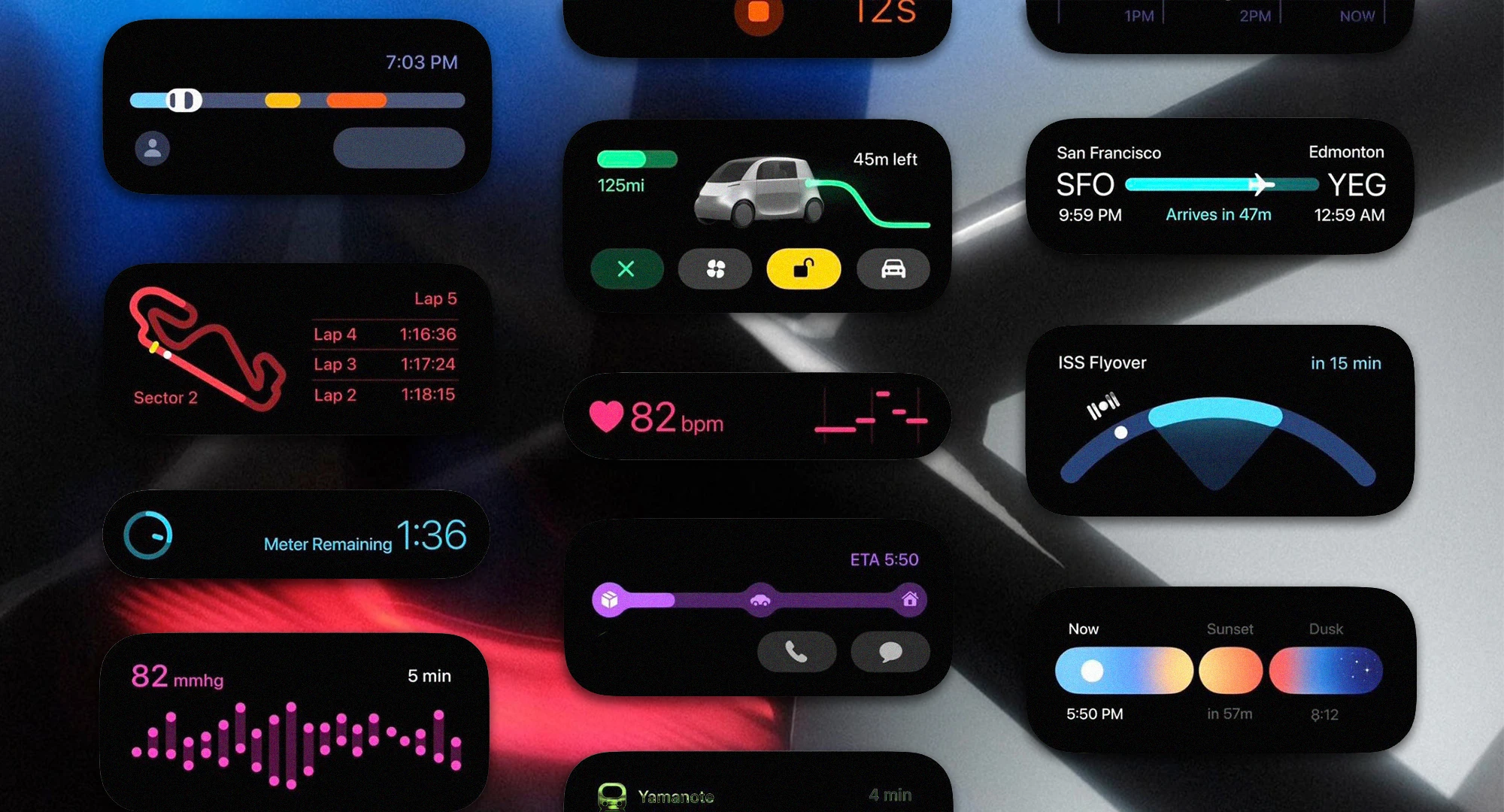
Top Travel & Hospitality Digital Software Development Agency to Work With - February 2026
Introduction
The Travel & Hospitality industry has seen a major shift in the past year, with a growing reliance on digital platforms to enhance guest experiences and streamline operations. In February 2026, selecting the right travel & hospitality digital software development agency has never been more critical.
While many companies are building internal teams, the need for a travel & hospitality digital software development agency remains strong due to specialized expertise, limited in-house bandwidth, and cost efficiency. In the following sections, we’ll uncover the top 10 travel & hospitality digital software development agency partners leading innovation in this space.
Here is a list of the top 10 travel & hospitality digital software development agency firms to consider in 2026
Top 10 Travel & Hospitality Digital Software Development Agencies
1. G & Co.
G & Co. is a leading travel and hospitality software development company helping the world’s most recognized brands innovate through custom digital solutions.
As one of the best digital agencies for hospitality and travel, G & Co. delivers custom software development for travel and hospitality enterprises looking to elevate guest experiences, unify booking systems, and streamline back-end operations. Known for partnering with luxury hotel groups, airline brands, and global travel conglomerates, G & Co. specializes in digital transformation in the travel industry through award-winning design, scalable architecture, and seamless integration across platforms. Their travel and hospitality software development services offer high performance and ROI-driven results tailored to large-scale enterprise needs.
G & Co. is a minority business enterprise (MBE), as certified by the National Minority Supplier Development Council (NMSDC). If diversity inclusion is a part of your supplier process, contact us—we may be a great fit for your enterprise.:
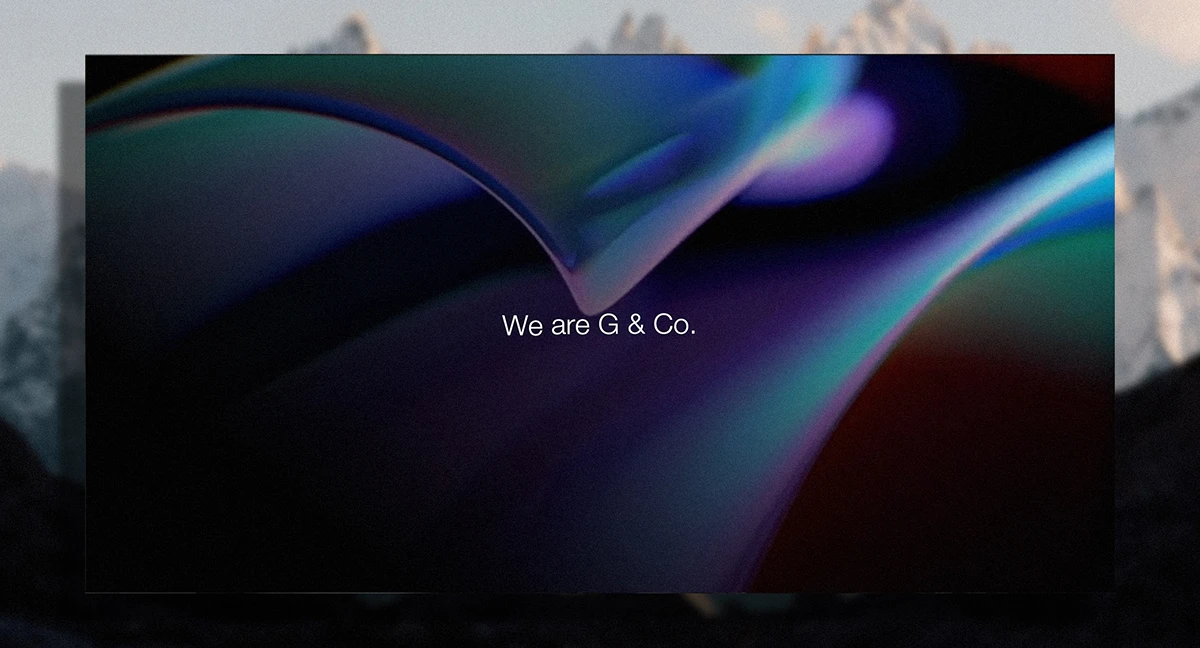
2. ThoughtWorks
ThoughtWorks is a global technology consultancy known for its agile-driven custom hospitality software development and scalable engineering solutions.
As a top travel software development company, ThoughtWorks brings deep expertise in digital transformation in the travel industry, having worked with major hospitality groups and transportation networks to modernize booking systems, build mobile-first experiences, and implement AI-based personalization. Their hospitality software development services are trusted by enterprise-level organizations to manage complex digital ecosystems and deliver global scalability.
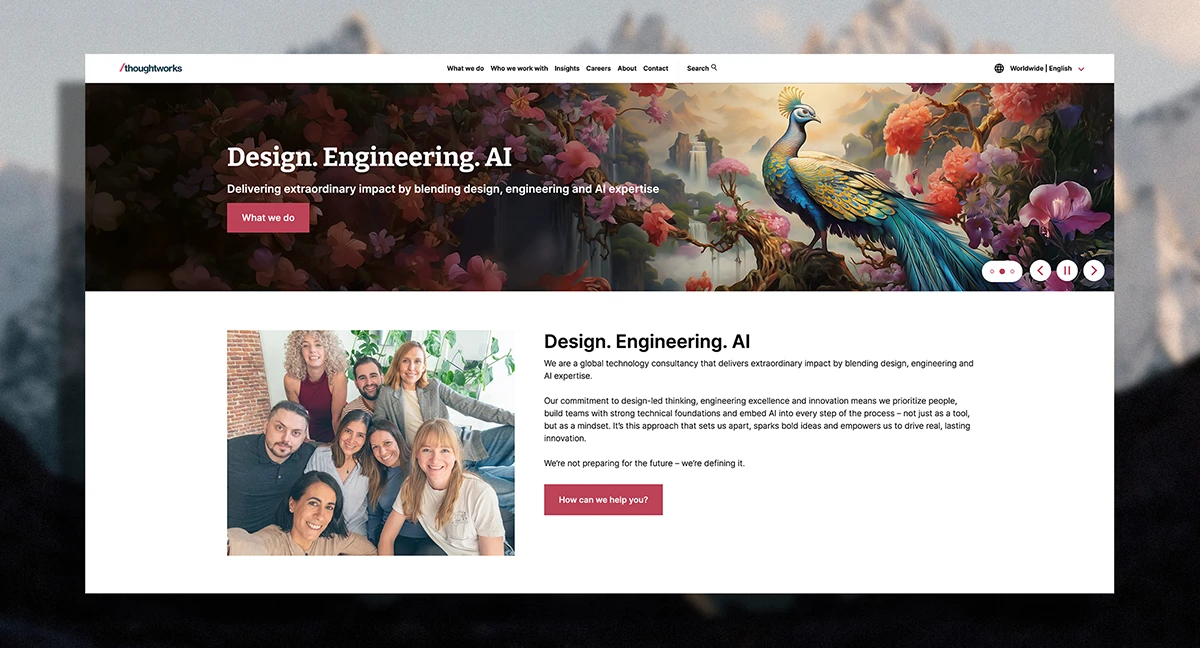
3. Netguru
Netguru is a travel digital transformation agency offering full-cycle travel software development services, from product design to deployment.
Netguru has helped travel startups and enterprise brands alike launch high-performance travel and hospitality platforms, with services ranging from mobile booking apps to custom travel software development for loyalty programs and itinerary management. As a hospitality software development company, Netguru is known for rapid prototyping, clean UX, and scalable backend development, making them one of the best travel software development company partners for digital-first hospitality brands.
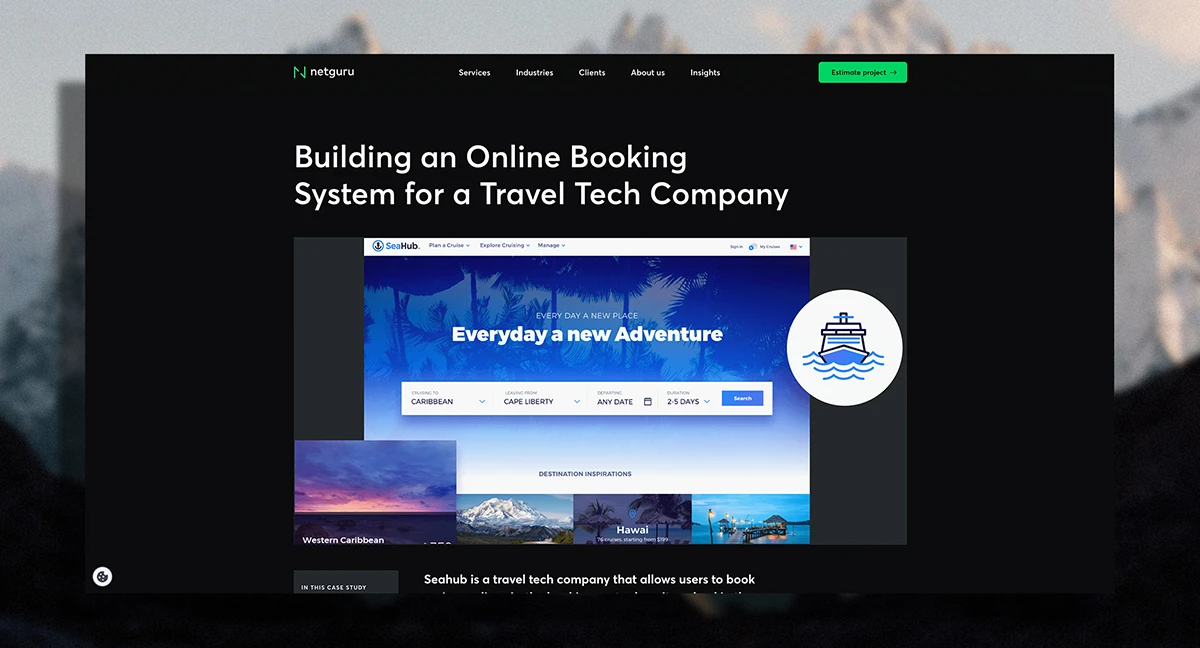
4. Geniusee
Geniusee is a software engineering firm specializing in custom travel software development and digital transformation for hospitality and tourism organizations.
With robust experience across travel and hospitality software development, Geniusee has built booking engines, guest management systems, and AI-powered travel recommendation tools. As a trusted hospitality software development services provider, they stand out for delivering cost-efficient and technically sound solutions that help hospitality clients modernize legacy systems and launch competitive digital products.
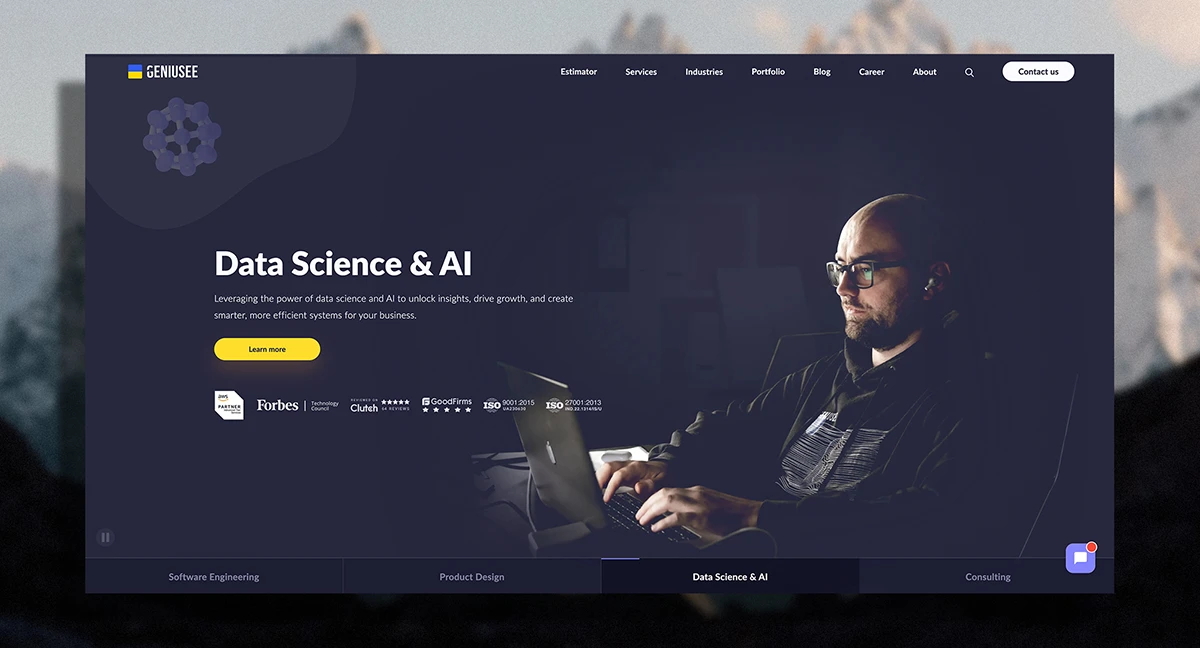
5. ELEKS
ELEKS is an enterprise-focused travel software development company known for delivering custom software development for travel businesses across the globe.
ELEKS brings a strong reputation in building custom travel software development platforms that integrate with payment systems, CRM tools, and third-party travel APIs. Their hospitality software development services cater to mid-to-large enterprises looking to enhance guest satisfaction through data-driven platforms, IoT solutions, and cloud-based infrastructure. Their work with tour operators and hotel chains has positioned them as a top travel and hospitality software development firm.
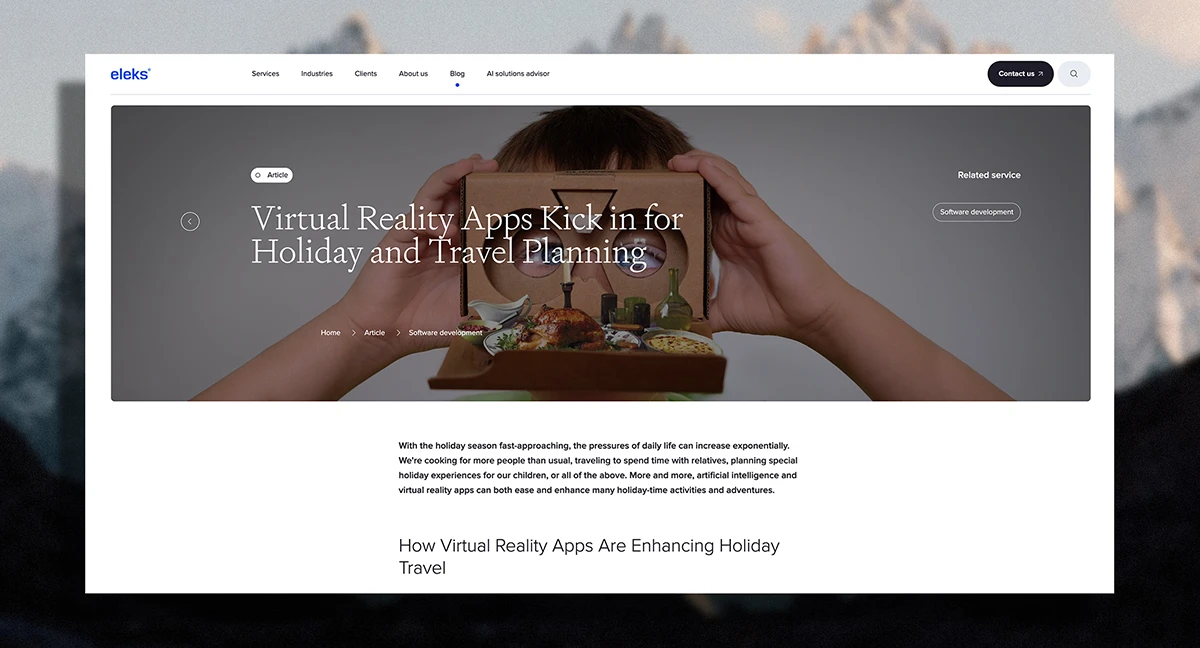
6. Intellectsoft
Intellectsoft is a digital consulting and software engineering company recognized for delivering digital transformation in the travel industry through scalable, secure platforms.
As a leading hospitality digital agency, Intellectsoft offers travel software development services tailored to large hospitality groups, cruise lines, and travel service providers. Their strength lies in custom hospitality software development that includes mobile check-in tools, smart concierge services, and loyalty platform integration—making them a go-to partner for enterprise hospitality software development.
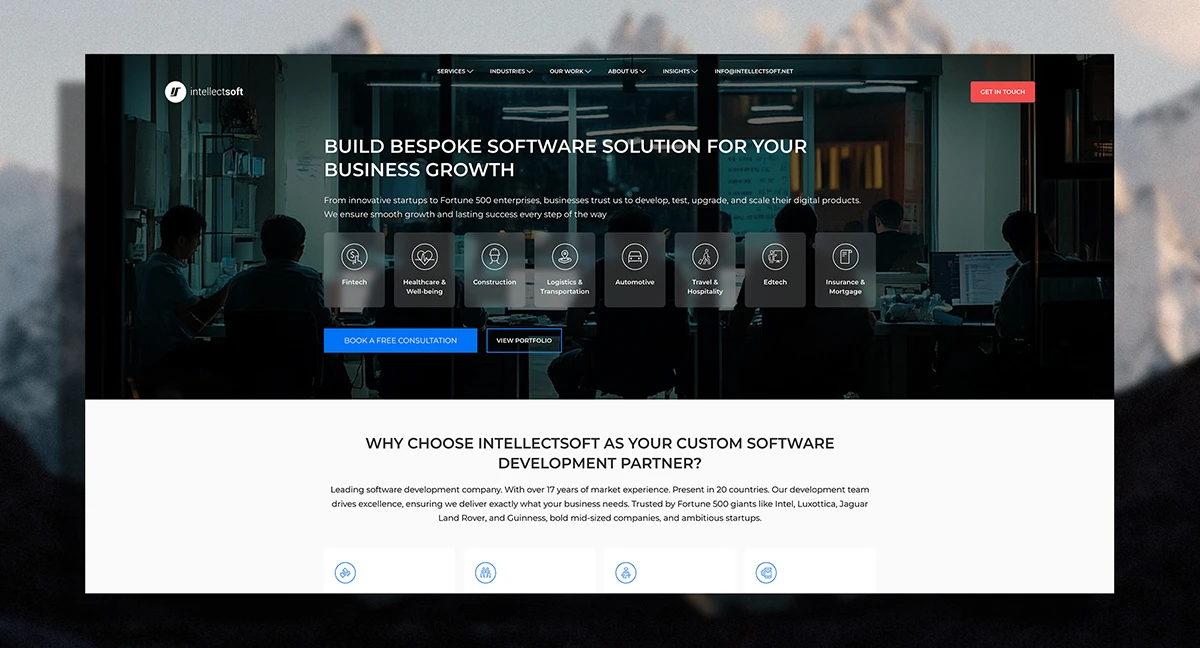
7. Sombra
Sombra is a custom software development company that delivers high-quality travel & hospitality software development services to enterprise clients worldwide.
Sombra’s projects span from custom booking systems and guest-facing apps to backend infrastructure for global travel platforms. As a hospitality software development company, they help travel brands overcome outdated systems and integrate emerging technologies to support seamless experiences. Their ability to deliver high-speed development with precision makes them a reliable partner for custom travel software development.
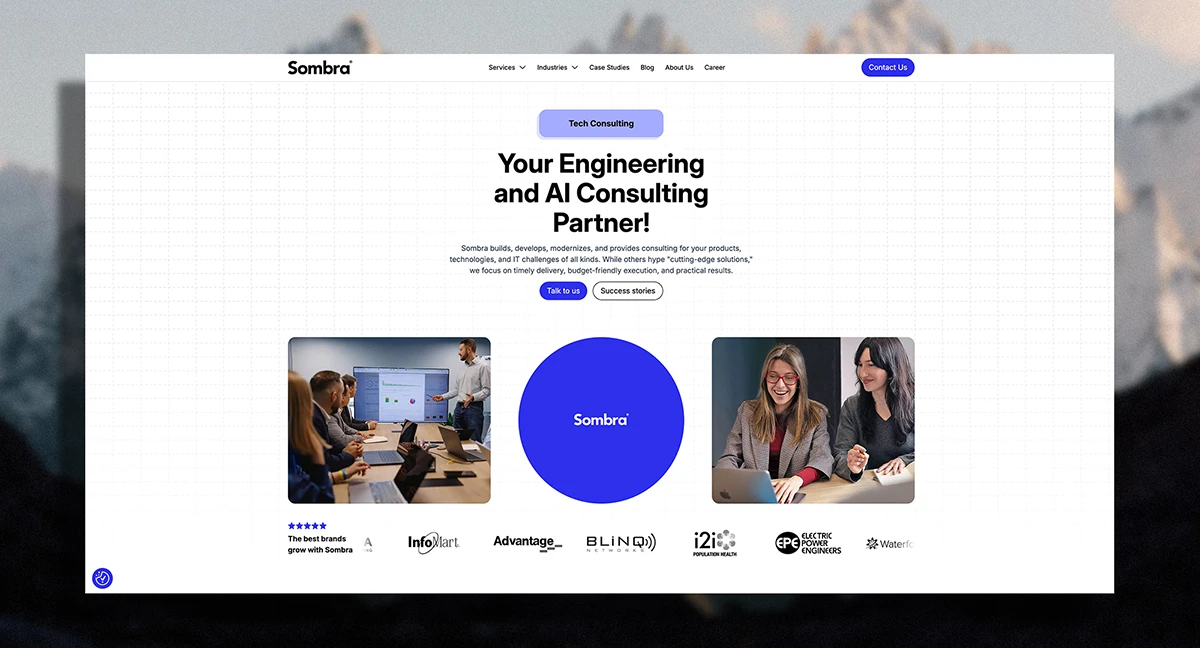
8. Trigent Software
Trigent Software is a digital engineering firm offering enterprise-grade travel and hospitality software development services with a focus on cloud scalability and automation.
Known as one of the best travel software development company choices for cost-effective transformation, Trigent enables travel businesses to build, test, and deploy scalable apps and platforms. Their travel software development solutions include itinerary builders, property management systems, and AI-based chatbots that streamline customer interactions and operational workflows.
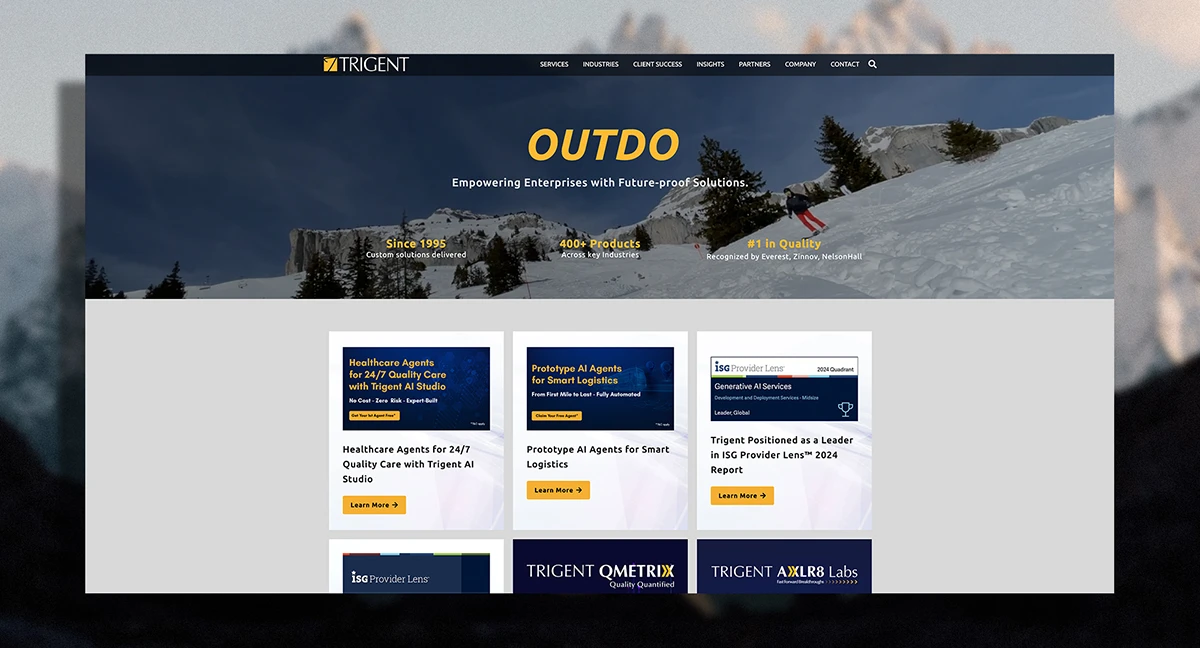
9. Miquido
Miquido is a full-service digital product development agency specializing in travel software development for mobile-first hospitality businesses.
Miquido blends strategy, design, and engineering to deliver end-to-end travel and hospitality software development, including booking engines, review management platforms, and personalization tools. As a hospitality software development company, they’ve worked with clients across Europe and North America to digitize services, enhance UX, and build connected ecosystems for guests and operators alike.
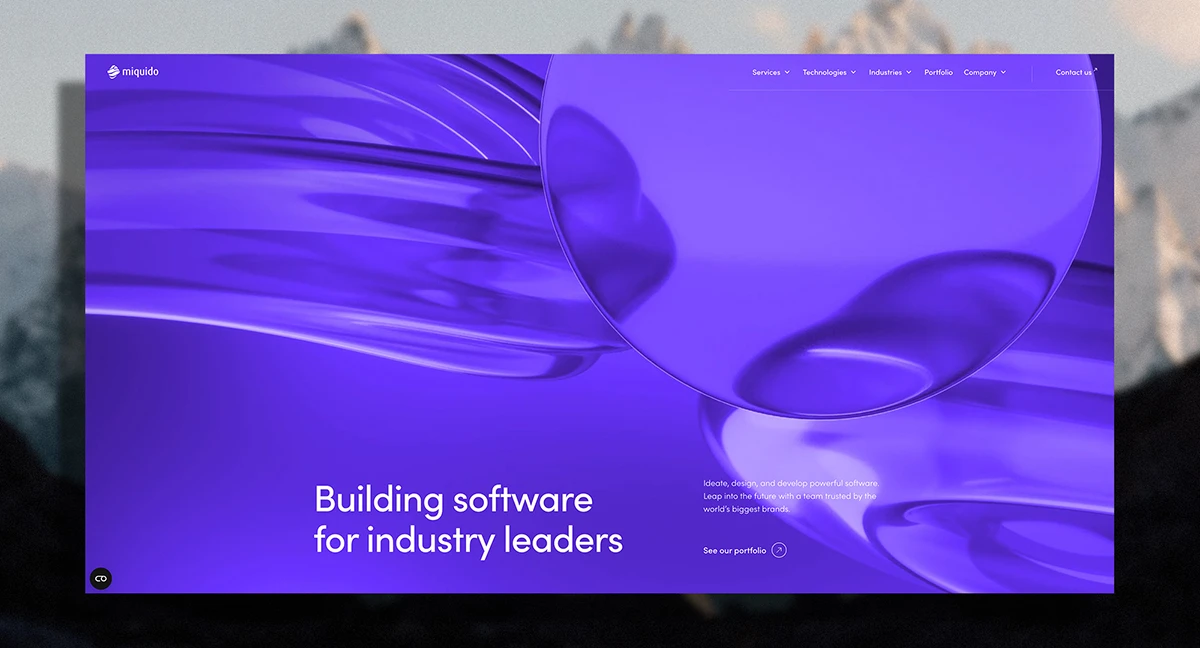
10. Binary Studio
Binary Studio is a boutique development firm providing custom software development for travel enterprises and mid-size hospitality brands.
With deep experience in travel software development services, Binary Studio helps clients build MVPs, enhance legacy platforms, and deploy scalable hospitality apps. Their strength lies in bridging technology and business outcomes, offering tailored travel and hospitality software development solutions that align with long-term brand goals and guest satisfaction priorities.
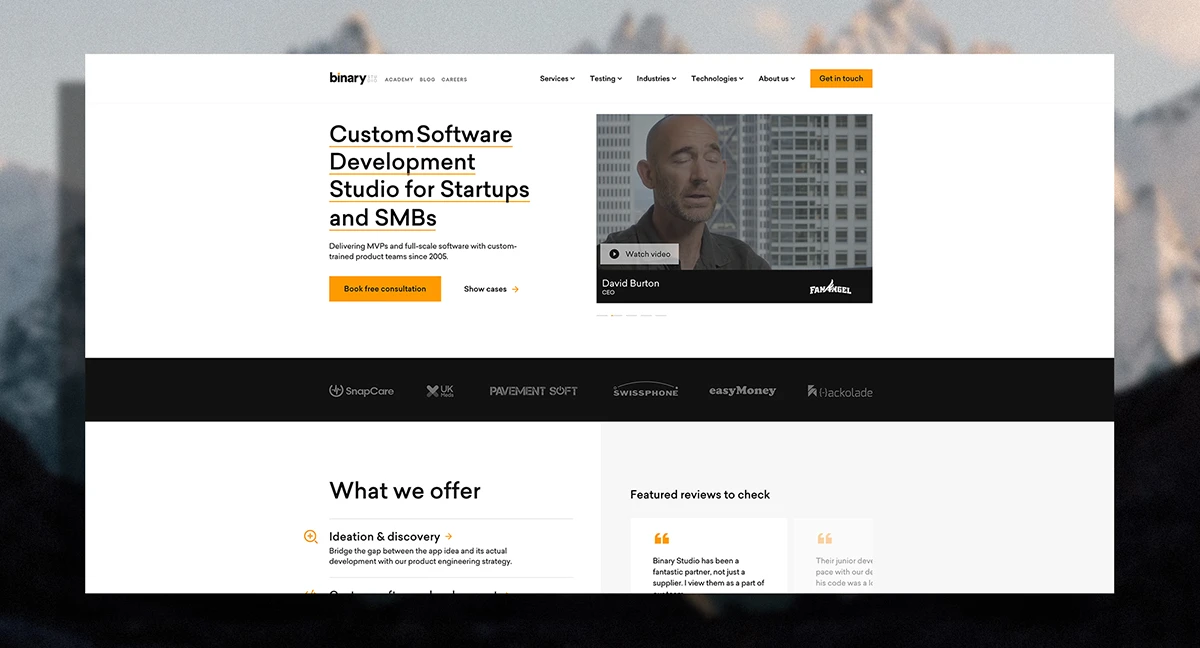
What Is a Travel & Hospitality Digital Software Development Agency?
A travel & hospitality digital software development agency is a specialized technology partner that designs, develops, and implements digital platforms tailored to the unique operational and customer engagement needs of the travel and hospitality sector. These agencies provide custom travel software development and hospitality software development services that support core business functions such as online booking, property management, guest personalization, mobile check-ins, loyalty programs, and backend analytics. As trusted technology advisors, they drive digital transformation in travel industry enterprises by integrating legacy systems, building scalable digital infrastructure, and optimizing user experiences across channels. The best travel software development company partners offer enterprise-grade platforms that elevate competitiveness and meet the evolving demands of today’s digitally native travelers.
In an industry defined by experience, efficiency, and personalization, the role of a travel & hospitality digital software development agency has become essential. These agencies offer end-to-end travel and hospitality software development services designed to meet the complex demands of modern travel companies and hospitality providers. From building scalable booking platforms to developing custom hospitality software that powers mobile check-ins, loyalty programs, and guest engagement tools, a top travel software development company enables seamless digital transformation in the travel industry. This section outlines the core capabilities that set the best travel software development company partners apart, showcasing how their expertise accelerates innovation and drives measurable results for enterprise brands.
What Services Do Travel & Hospitality Digital Software Development Agencies Provide?
Custom Travel Software Development
Custom travel software development is at the core of what a travel & hospitality digital software development agency offers. These tailored solutions are designed to meet the specific needs of airlines, hotels, resorts, cruise lines, and tour operators—delivering platforms that manage reservations, itineraries, and user profiles seamlessly. A top travel software development company ensures that the final product aligns with both operational workflows and guest expectations, enabling smoother travel experiences and backend efficiency.
Booking Engine Development
Booking engine development is a key offering that enables clients to manage reservations in real time across multiple devices and platforms. A hospitality software development company builds responsive, secure, and scalable booking systems that integrate with payment gateways, inventory management tools, and CRM platforms. These systems support dynamic pricing, package customization, and upselling, driving both revenue and customer satisfaction.
Mobile App Development
Mobile app development allows travel and hospitality brands to stay connected with guests before, during, and after their journey. As a core service of a hospitality digital agency, mobile apps are custom-built to handle features such as mobile check-in/check-out, digital room keys, loyalty program access, and real-time alerts. This capability reflects the growing need for mobile-first travel experiences and supports the digital transformation in travel industry operations.
CRM & Loyalty Integration
CRM and loyalty integration services are critical for building guest relationships and driving repeat business. A travel software development company offers solutions that sync guest data, preferences, and behavioral insights into personalized marketing campaigns and loyalty programs. These integrations improve customer retention and lifetime value, forming a foundational element of custom hospitality software development.
Property Management Systems (PMS)
Property Management System development supports hotel and resort clients in managing daily operations such as check-ins, housekeeping, billing, and staff coordination. A leading hospitality software development company customizes PMS platforms to ensure seamless integration with booking engines, payment systems, and guest service tools—enhancing operational visibility and real-time decision-making across properties.
Travel Portal Development
Travel portal development helps travel agencies, aggregators, and OTAs centralize services such as flight search, hotel booking, car rentals, and travel insurance into one unified platform. These portals are built by travel and hospitality software development agencies with APIs that connect to global distribution systems (GDS), travel inventory databases, and customer review platforms. This service is a critical asset for companies seeking to deliver end-to-end customer experiences.
Third-Party API Integration
Third-party API integration services enable travel and hospitality companies to expand functionality and enhance user experience. A travel software development company connects clients to services such as Google Maps, weather forecasts, airline systems, hotel chains, and payment gateways—ensuring that applications are fully functional, up-to-date, and capable of handling complex travel logistics in real time.
Data Analytics & Reporting
Data analytics and reporting services help clients leverage business intelligence to improve service quality and operational efficiency. Hospitality software development services include tools that track KPIs such as occupancy rates, customer satisfaction, and booking trends, while offering dashboards for data-driven decision-making. These insights support continuous improvement and strategic planning across travel and hospitality operations.
AI & Chatbot Development
AI and chatbot development allows clients to automate customer service and personalize user interactions at scale. A top hospitality digital agency designs intelligent assistants for booking assistance, FAQ resolution, feedback collection, and upselling opportunities. These tools enhance efficiency while maintaining a high standard of guest engagement, aligning with the broader goals of digital transformation in the travel industry.
UX/UI Design & Optimization
UX/UI design and optimization services ensure that every digital interface—from mobile apps to booking engines—delivers intuitive, seamless, and visually engaging experiences. A travel and hospitality software development agency focuses on usability testing, accessibility, and responsive design to meet the expectations of today’s tech-savvy travelers. These services are critical for improving conversion rates and brand loyalty across platforms.
Let’s kickstart the conversation and design stuff people will love.

How Long Does a Travel & Hospitality Engagement Take to Complete?

Understanding the timeline of an engagement with a travel & hospitality digital software development agency is essential for effective planning and execution. These timelines can vary based on project complexity, scope, integration requirements, and the level of customization needed—ranging from a few weeks for MVPs to several months for enterprise-scale deployments. Whether developing a custom booking engine, a mobile app, or a comprehensive travel management platform, the best travel software development company will follow a structured, phased approach that includes discovery, design, development, testing, and deployment. This section will outline typical timeframes and key milestones associated with travel and hospitality software development services to help stakeholders align expectations and resources.
Here is a list of factors that influence how long a travel & hospitality engagement may take when working with a travel & hospitality digital software development agency:
Project Scope
The overall project scope is a primary determinant of engagement duration. A travel software development company will need to assess whether the initiative involves a single feature like a booking engine or a full end-to-end platform that integrates mobile apps, CRM, and property management systems. Larger, enterprise-scale projects involving full digital transformation in the travel industry often require multi-phase rollouts over several months, while smaller-scale custom travel software development projects may be completed in weeks.
Customization Requirements
The degree of customization requested will significantly impact project timelines. Travel and hospitality software development services that involve building new systems from the ground up—such as custom hospitality software development or tailored loyalty platforms—naturally require more design, development, and testing time. Conversely, engagements that rely on modifying existing frameworks or integrating off-the-shelf solutions can accelerate delivery without compromising functionality.
Integration Complexity
Timelines are extended when third-party API integration or synchronization with legacy systems is involved. Whether integrating with global distribution systems (GDS), payment gateways, customer review platforms, or CRM tools, the complexity of these connections must be accounted for. A hospitality software development company will typically allocate additional time for ensuring seamless, secure data exchange across systems, which is essential for any robust travel & hospitality software development project.
Platform and Device Coverage
Developing platforms across web, iOS, Android, and even in-property kiosks increases both testing and development efforts. A travel digital transformation agency creating unified guest experiences across channels will need to ensure consistency in design and functionality, which can extend the timeline compared to single-platform travel software development services. Multi-device optimization is critical to meet the demands of today’s always-connected travelers.
Regulatory and Security Compliance
For any travel and hospitality software development project, especially those involving personal data, compliance with regulations like GDPR, PCI-DSS, or ADA accessibility standards is non-negotiable. Building in security protocols, data encryption, and legal compliance frameworks can lengthen the development cycle. The best travel software development company will prioritize these elements early in the project to prevent delays during deployment or review phases.
Feedback and Revision Cycles
Client availability and responsiveness also shape project length. Travel and hospitality software development services typically involve collaborative review sessions, sprint demos, and iterative feedback cycles. If stakeholders are delayed in approvals or request frequent revisions, timelines can shift. An experienced hospitality digital agency will plan for these contingencies with buffer time built into the roadmap.
Testing and Quality Assurance
Extensive testing is required to ensure that custom travel software development functions properly across geographies, languages, payment methods, and device types. A hospitality software development company typically allocates dedicated sprints for usability testing, bug fixing, performance validation, and security audits. This quality assurance process is critical to ensure the final product meets both business and guest expectations.
Team Size and Resourcing
The size and specialization of the assigned team—developers, UX designers, project managers, QA engineers—impacts delivery timelines. A best travel software development company with a well-resourced team can accelerate execution without sacrificing quality. However, niche custom hospitality software development projects that require rare skill sets may take longer due to onboarding or upskilling time.
Change Management and Internal Readiness
If the travel or hospitality brand requires organizational shifts to support a new system—such as training, new workflows, or stakeholder onboarding—these internal factors must also be considered. A top travel and hospitality software development agency will often offer consulting support to facilitate digital transformation in the travel industry, which may add time upfront but ensures long-term adoption and ROI.
How Travel & Hospitality Digital Software Development Agencies Price Their Work
When evaluating a partnership with a travel & hospitality digital software development agency, understanding the pricing structure is critical for aligning budget expectations with project goals. Pricing can vary significantly depending on the scope, complexity, and customization required—ranging from modular feature builds to full-scale enterprise platforms. Whether the engagement involves travel software development, custom hospitality software development, or comprehensive travel and hospitality software development services, cost is typically influenced by factors such as timeline, integration needs, and resource allocation. This section explores the key pricing considerations companies should anticipate when working with a travel software development company or hospitality digital agency to ensure a strategic and cost-effective investment.
Project Scope and Complexity
The overall scope and technical complexity of a project significantly influence how a travel & hospitality digital software development agency prices its services. Whether it's a single-platform mobile booking app or a multi-system travel and hospitality software development solution spanning CRM, PMS, and custom APIs, broader functionality and deeper technical requirements demand more development hours and higher pricing. Custom travel software development projects that require advanced features such as real-time inventory syncing, loyalty program automation, or AI personalization are typically priced at a premium due to the increased effort, testing, and integration involved.
Level of Customization
The extent of customization required plays a major role in determining cost. Off-the-shelf solutions or template-based builds generally cost less than fully custom hospitality software development tailored to specific brand requirements. Agencies offering travel software development services must account for the time and resources needed to design, prototype, develop, and refine interfaces and workflows that are uniquely suited to a client’s goals. The more tailored the solution, the more investment is required—especially for brands seeking highly differentiated digital experiences in a competitive market.
Technology Stack and Integrations
The selection of technology stack and the number of third-party systems that need to be integrated can substantially affect pricing. A travel software development company must factor in compatibility with existing systems like GDS, payment processors, CRMs, and PMS platforms when estimating costs. Complex integration efforts—especially those involving outdated or fragmented systems—demand additional time for development, testing, and support, which increases the total engagement cost. This is especially true for enterprise-level travel and hospitality software development services that span multiple legacy systems and require scalable, secure architecture.
Design and User Experience Requirements
High-quality UX/UI design is a central component of travel & hospitality software development and can significantly impact the pricing of an engagement. Clients seeking elevated, custom-designed digital interfaces that support brand positioning and drive conversions will incur higher design and research costs than those opting for standard templates. A hospitality digital agency offering top-tier visual and functional design services—such as mobile responsiveness, multilingual support, and accessibility—will price these enhancements accordingly to reflect their strategic value in guest experience.
Development Timeline
The project timeline directly influences pricing, especially if a faster turnaround is required. Expedited development often requires larger teams, extended work hours, and compressed testing cycles—all of which result in higher costs. A best travel software development company will typically offer tiered pricing based on standard delivery schedules versus accelerated timelines, helping travel and hospitality brands weigh the trade-offs between speed and budget. Rushed timelines for custom travel software development are priced at a premium to ensure quality and minimize risk.
Maintenance and Support
Ongoing maintenance, updates, and support are additional cost factors that agencies consider when pricing an engagement. Travel and hospitality software development services often include post-launch support for bug fixes, performance monitoring, platform updates, and feature enhancements. Depending on the complexity of the platform and the level of SLA (Service Level Agreement) required, these services can be priced as monthly retainers or annual packages. Long-term support from a travel digital transformation agency ensures continued performance and evolution, which is especially valuable in a rapidly shifting digital travel landscape.
Team Composition and Expertise
The composition of the project team—ranging from developers and designers to strategists and QA engineers—also impacts overall cost. Engaging a hospitality software development company with senior-level specialists or niche expertise in travel domain architecture or AI personalization will come at a higher price point. Pricing models reflect the caliber of talent required, ensuring that enterprise clients receive the technical depth and strategic oversight needed to deliver scalable, secure, and innovative travel software development solutions.
Geographic Location of the Agency
The agency’s location and delivery model (onshore, nearshore, offshore) can influence pricing based on cost-of-living differences, resource availability, and time zone alignment. For example, a U.S.-based travel software development company may charge significantly more than an offshore provider for the same level of service. However, clients often pay a premium for onshore agencies due to closer collaboration, fewer communication barriers, and stronger alignment with compliance and security standards—especially for enterprise-level digital transformation in the travel industry.
Why Hire a Travel & Hospitality Digital Software Development Agency

Partnering with a travel & hospitality digital software development agency offers a strategic advantage for companies looking to stay competitive in an increasingly digital, experience-driven market. As consumer expectations continue to rise and operational demands grow more complex, travel and hospitality brands require advanced, scalable, and user-centric digital solutions that go beyond what in-house teams alone can deliver. Whether the goal is to streamline booking systems, enhance guest personalization, or modernize backend infrastructure, working with a specialized travel software development company ensures access to the technical expertise, industry knowledge, and innovation needed to drive successful digital transformation in the travel industry. This section explores the key reasons why engaging a top-tier hospitality software development company is essential for long-term growth and operational excellence.
Industry-Specific Technical Expertise
A travel & hospitality digital software development agency offers deep, industry-specific technical knowledge that generalist firms often lack. These agencies understand the unique challenges of the sector—ranging from seasonality and booking flow complexity to legacy infrastructure and guest personalization. As a result, they design travel and hospitality software development services tailored to the operational needs of airlines, hotels, resorts, and travel agencies. With experience across travel software development, custom hospitality software development, and integration of APIs like GDS and CRM platforms, these agencies deliver solutions that align precisely with the expectations and requirements of the modern travel landscape.
Accelerated Digital Transformation
For many companies, partnering with a travel digital transformation agency is the fastest way to implement meaningful change. Rather than overextending in-house IT departments, businesses can leverage external experts to deliver scalable platforms, mobile apps, and digital portals built on the latest technologies. These agencies specialize in digital transformation in the travel industry, helping brands modernize outdated systems, migrate to cloud infrastructure, and implement automation. By tapping into end-to-end travel and hospitality software development services, businesses gain the agility and speed needed to stay competitive and relevant in a rapidly evolving market.
Custom-Built Solutions for Competitive Advantage
Unlike generic software providers, a travel software development company focuses on creating custom travel software development solutions that differentiate brands in a crowded marketplace. Whether developing a bespoke booking engine, a loyalty rewards app, or a guest communication platform, these solutions are built to meet the precise goals of the business and the behaviors of its target audience. The ability to build and iterate on custom hospitality software development not only improves operational efficiency but also enhances customer loyalty and brand experience.
Seamless System Integration
Working with a hospitality software development company ensures that all digital systems—from CRM to PMS to third-party travel services—are tightly integrated and function as a unified ecosystem. These agencies are skilled at handling complex integrations, including payment gateways, inventory management platforms, and API-based booking systems. This ensures a consistent user experience and real-time data flow, which is critical for delivering high-quality travel and hospitality experiences across devices and channels. Travel and hospitality software development services are designed to support seamless, secure, and scalable integrations that improve both front-end performance and backend operations.
Scalable Architecture for Growth
Scalability is a key reason businesses choose to work with a hospitality digital agency. As demand fluctuates due to seasonality, promotions, or market expansion, companies need software that can handle sudden spikes in traffic, transactions, and user interactions without performance degradation. A travel software development company builds scalable, cloud-based systems that can grow with the business, ensuring long-term sustainability. Travel & hospitality software development emphasizes architecture that supports new features, international rollouts, and enterprise-level complexity—without the need for costly replatforming.
Cost Efficiency and Resource Optimization
Engaging a travel & hospitality digital software development agency is often more cost-effective than building, hiring, and managing a full internal development team—especially for enterprise-grade projects. Businesses gain access to highly specialized talent and proven frameworks without the overhead of recruitment, training, and long-term retention. With travel software development services structured around agile delivery, milestones, and performance benchmarks, businesses can control costs while achieving faster time-to-market. Custom travel software development also reduces reliance on subscription-based third-party platforms, offering long-term ROI through ownership and flexibility.
Continuous Innovation and Competitive Edge
Agencies specializing in travel and hospitality software development stay at the forefront of technology trends, ensuring their clients benefit from continuous innovation. From AI-powered chatbots and personalization engines to voice search and IoT integrations, the best travel software development company partners proactively introduce new tools that enhance user experience and operational intelligence. By working with a hospitality digital agency, businesses are better positioned to adapt to market shifts, adopt emerging technologies, and maintain a competitive edge in an industry where innovation is key to guest loyalty and revenue growth.
How to Choose The Most Reliable Travel & Hospitality Digital Software Development Agency
Selecting the right travel & hospitality digital software development agency is a critical decision that can directly impact a company’s ability to innovate, scale, and compete in an increasingly digital travel landscape. With rising guest expectations, evolving technologies, and complex integration needs, businesses must partner with an agency that not only understands software development but also the unique demands of the travel and hospitality sector. This section will explore the most important factors to consider when evaluating a travel software development company or hospitality digital agency, helping businesses make informed choices that align with their strategic goals and long-term vision.
Proven Experience in Travel & Hospitality Software Development
When selecting a travel & hospitality digital software development agency, proven experience in delivering travel software development and hospitality software development services should be a top priority. Agencies with a successful track record in the travel and hospitality industry understand sector-specific requirements such as seasonal demand fluctuations, real-time booking engines, and multi-system integration. Their past performance demonstrates not only technical capability but also domain knowledge that accelerates execution and minimizes risk. Choosing a travel software development company with industry experience ensures a smoother development process and a more aligned final product.
Custom Software Development Capabilities
The ability to deliver custom travel software development is essential for meeting unique business needs and differentiating in a crowded market. A top travel software development company should offer tailored solutions—whether it’s building a proprietary guest loyalty system, a unique travel portal, or a custom hospitality software development project designed to streamline internal operations. Customization allows businesses to adapt to their own workflows, integrate with specific systems, and offer personalized digital experiences that drive engagement and growth.
Expertise in Digital Transformation
Digital transformation in the travel industry requires more than just technical development; it demands strategic vision and enterprise-level implementation. The ideal travel digital transformation agency should have a demonstrated ability to modernize legacy systems, build scalable cloud infrastructure, and support omnichannel experiences across mobile, web, and in-property platforms. Look for a partner that not only delivers hospitality software development services but also brings consultative insight on how to future-proof your tech stack and operations through digital transformation.
Integration and API Experience
System integration is a cornerstone of any travel and hospitality software development project. A reliable hospitality software development company must have experience working with APIs for global distribution systems (GDS), payment gateways, CRM tools, property management systems (PMS), and third-party travel services. Proper integration ensures data consistency, operational efficiency, and seamless user experiences. Without this expertise, businesses risk siloed systems and fragmented customer journeys—so it’s crucial to vet your agency’s ability to deliver comprehensive, connected solutions.
Scalability and Performance Optimization
As travel brands grow, their digital platforms must scale accordingly. The right travel & hospitality digital software development agency will design and build platforms with scalability and performance optimization in mind, allowing for increased traffic, global rollouts, and evolving feature requirements. A travel software development company should emphasize modular architecture, load balancing, and cloud-native development to ensure long-term sustainability. These considerations are particularly vital for enterprise businesses aiming to stay competitive during peak seasons or expansion phases.
Strong UX/UI Design Focus
In the Travel & Hospitality space, user experience is directly tied to revenue and customer loyalty. Look for a hospitality digital agency that integrates UX/UI design from the start, crafting intuitive, responsive interfaces across all user touchpoints. Whether developing booking platforms, mobile apps, or check-in kiosks, the agency should prioritize usability and visual appeal. A strong design team ensures your travel and hospitality software development services not only function well but also delight and retain users through consistent and polished experiences.
Transparent Communication and Project Management
Successful engagements require clear communication and efficient project management. A best travel software development company should offer detailed roadmaps, regular updates, and collaborative feedback loops throughout the development cycle. Transparency around timelines, deliverables, and potential roadblocks is key to keeping stakeholders aligned and projects on track. Agencies that use agile methodologies or hybrid models demonstrate flexibility and responsiveness—crucial traits for complex, evolving travel software development services.
Ongoing Maintenance and Support
Post-launch success depends heavily on ongoing maintenance, support, and system optimization. A dependable travel & hospitality digital software development agency will offer continuous support services including bug fixes, performance monitoring, security updates, and feature enhancements. These services ensure that your custom travel software development solution remains reliable, secure, and scalable well after deployment. Choosing a partner committed to long-term hospitality software development services ensures sustained ROI and system health.
Strong Client Portfolio and Testimonials
A well-documented history of successful client engagements serves as social proof of a firm’s capabilities. When evaluating travel software development companies, look for agencies with a strong portfolio of travel and hospitality clients, backed by testimonials or case studies. This not only validates the agency’s experience in custom hospitality software development but also highlights their ability to deliver measurable results across various segments of the travel and hospitality ecosystem.
Security and Compliance Awareness
Handling sensitive guest information, payment data, and booking histories requires rigorous attention to cybersecurity and compliance. The ideal travel software development company should demonstrate a clear understanding of industry-specific compliance standards such as PCI-DSS, GDPR, and ADA accessibility requirements. Security must be embedded in every layer of the software—from infrastructure to interface—ensuring that your travel and hospitality software development services meet both legal obligations and user expectations.
15 Questions To Ask a Travel & Hospitality Digital Software Development Agency Before You Hire One

Before selecting a travel & hospitality digital software development agency, it’s essential for businesses to ask the right questions to ensure the agency is equipped to meet their unique operational, technical, and strategic needs. From understanding how the agency approaches travel software development to evaluating their experience with system integrations and digital transformation in the travel industry, these questions can reveal critical insights that influence the success of the partnership. This section outlines the most important questions companies should consider asking before hiring a travel software development company or hospitality digital agency to ensure alignment, transparency, and long-term value.
- What experience do you have specifically in travel and hospitality software development?
- Can you share examples of past projects or case studies in the travel industry?
- What travel software development services do you offer from start to finish?
- How do you approach custom software development for travel and hospitality brands?
- What systems and third-party platforms are you experienced in integrating (e.g., GDS, PMS, CRM)?
- What is your typical project timeline for a travel & hospitality software development engagement?
- How do you ensure scalability and performance optimization in the platforms you build?
- What is your process for UX/UI design in travel and hospitality applications?
- How do you manage data security, compliance, and regulatory standards like PCI-DSS or GDPR?
- Do you offer ongoing maintenance and support after the software is launched?
- What industries or verticals within travel and hospitality do you specialize in (e.g., hotels, airlines, OTAs)?
- What is your pricing model, and how do you estimate costs for complex travel software development projects?
- How do you handle communication, project updates, and collaboration with internal teams?
- Can your team support digital transformation in the travel industry through consulting and strategy?
- What technologies and frameworks do you use in your hospitality software development services?
What experience do you have specifically in travel and hospitality software development?
Understanding an agency’s experience in travel and hospitality software development is critical for assessing whether they can meet the industry’s complex requirements. A travel & hospitality digital software development agency with a strong portfolio in this space will be well-versed in sector-specific challenges such as seasonality, booking flow optimization, guest personalization, and system interoperability. Their hands-on experience can significantly reduce the learning curve, enabling faster delivery and more precise execution. A seasoned travel software development company will also be familiar with emerging trends and best practices, ensuring your platform is both competitive and future-proof.
Can you share examples of past projects or case studies in the travel industry?
Reviewing case studies and real-world examples of previous travel and hospitality software development projects provides insight into the agency’s capabilities and track record. These examples help validate the agency’s expertise in delivering custom travel software development, integrating systems, and creating scalable platforms that solve business challenges. A hospitality software development company with proven results demonstrates its ability to drive digital transformation in the travel industry and offer solutions aligned with specific operational goals. Seeing how they’ve helped similar clients offers a clear indication of what to expect in terms of quality, innovation, and performance.
What travel software development services do you offer from start to finish?
It’s important to assess the full scope of services a travel & hospitality digital software development agency offers—from initial discovery and UX/UI design to development, deployment, and post-launch support. A well-rounded agency will deliver end-to-end travel and hospitality software development services, enabling a seamless process that minimizes handoffs and ensures accountability. Whether the project involves a new booking engine, a mobile app, or a full backend overhaul, the agency should have capabilities in custom hospitality software development, systems integration, and long-term maintenance to support ongoing business growth.
How do you approach custom software development for travel and hospitality brands?
Custom software development for travel and hospitality brands must reflect the unique workflows, customer needs, and brand objectives of each client. A top travel software development company will take a consultative approach—starting with discovery, mapping use cases, designing tailored interfaces, and architecting scalable platforms. Asking this question helps evaluate whether the agency prioritizes personalization, scalability, and functionality in their travel and hospitality software development services. The right partner should be able to adapt to your business model rather than forcing you into a templated framework.
What systems and third-party platforms are you experienced in integrating (e.g., GDS, PMS, CRM)?
System integration is a cornerstone of successful travel & hospitality software development, and it’s vital to confirm that an agency has experience integrating with platforms such as Global Distribution Systems (GDS), Property Management Systems (PMS), Customer Relationship Management (CRM) tools, and payment gateways. These integrations streamline workflows, improve user experiences, and enable real-time data sharing. A qualified hospitality software development company should be well-versed in handling complex integrations that support seamless guest journeys and backend efficiency. Their ability to work with your existing tech stack is essential for project success.
What is your typical project timeline for a travel & hospitality software development engagement?
Understanding the estimated timeline of a digital engagement is crucial for planning and resource allocation. A reliable travel & hospitality digital software development agency should be able to offer transparent timeframes for each phase—discovery, design, development, testing, and deployment—based on the scope and complexity of the project. Travel software development services vary widely in duration, so clarity on project milestones, potential bottlenecks, and delivery expectations will help align internal teams and avoid costly delays. This insight ensures that your travel software development company can meet your launch goals without compromising quality.
How do you ensure scalability and performance optimization in the platforms you build?
Scalability and performance are critical for any travel and hospitality software development solution, especially during high-traffic periods or market expansion. This question uncovers how a travel software development company approaches infrastructure planning, load balancing, and optimization techniques to handle growing user demand. A top hospitality digital agency will design modular, cloud-native systems with built-in performance monitoring and automated scaling. Their ability to future-proof your digital platforms directly impacts your brand’s ability to grow efficiently and remain reliable under pressure.
What is your process for UX/UI design in travel and hospitality applications?
User experience plays a defining role in the success of any travel and hospitality platform, influencing conversion rates, guest satisfaction, and brand perception. Asking about the agency’s UX/UI process helps determine whether their design team understands the behaviors and expectations of modern travelers. A travel software development company that conducts user research, wireframes, usability testing, and visual design iterations is more likely to deliver intuitive, responsive, and aesthetically aligned interfaces. The agency’s design process should reflect the unique requirements of the hospitality sector, from accessibility to mobile-first engagement.
How do you manage data security, compliance, and regulatory standards like PCI-DSS or GDPR?
Travel and hospitality businesses handle large volumes of sensitive customer data—payment information, passport details, and personal preferences—making data security and compliance non-negotiable. A competent hospitality software development company should be well-versed in meeting standards like PCI-DSS for secure transactions, GDPR for data privacy, and ADA for digital accessibility. Their security protocols should span every layer of development, from encryption and secure APIs to authentication systems and breach monitoring. Asking this question ensures that the travel software development services you receive are both legally compliant and reputationally safe.
Do you offer ongoing maintenance and support after the software is launched?
Post-launch support is essential for the long-term success of any travel and hospitality software development project. Once a platform goes live, it requires ongoing updates, performance monitoring, security patches, and feature enhancements to stay competitive and secure. A travel software development company that offers dedicated maintenance services demonstrates its commitment to long-term value and performance. This support ensures that issues are resolved quickly, new opportunities are explored, and the platform continues to evolve with user needs and industry trends.
What industries or verticals within travel and hospitality do you specialize in (e.g., hotels, airlines, OTAs)?
Not all travel and hospitality segments operate the same, so it’s important to confirm whether the agency has experience in your specific vertical. Whether it’s hotels, airlines, cruise lines, tour operators, or online travel agencies (OTAs), each sector has unique software requirements. A travel software development company with focused experience in your niche will be better equipped to deliver tailored solutions and anticipate sector-specific challenges. Their knowledge of best practices, KPIs, and competitive dynamics ensures a more aligned, high-impact engagement.
What is your pricing model, and how do you estimate costs for complex travel software development projects?
Clarifying pricing models and cost estimation practices helps businesses align expectations and plan their budgets. A trustworthy travel & hospitality digital software development agency should be able to explain whether they charge hourly, per milestone, or via fixed-rate contracts. They should also outline how factors such as custom development, integrations, and timeline acceleration affect pricing. Travel software development services often require flexibility in budgeting, and a transparent pricing structure ensures there are no surprises down the line—especially for large-scale digital transformation projects.
How do you handle communication, project updates, and collaboration with internal teams?
Effective communication is the foundation of any successful digital partnership. It’s important to know how the agency manages regular check-ins, status reports, project dashboards, and feedback loops throughout the engagement. A best travel software development company will employ agile methodologies or hybrid models to maintain alignment with internal teams and stakeholders. Asking about their communication tools, workflows, and escalation paths ensures that the collaboration remains efficient, transparent, and productive from kickoff to completion.
Can your team support digital transformation in the travel industry through consulting and strategy?
Beyond technical execution, many companies require guidance in shaping a long-term digital vision. A top-tier travel digital transformation agency should offer consulting services that include technology audits, platform strategy, competitive benchmarking, and roadmap development. Asking this question helps determine whether the agency can serve as a strategic partner—not just a vendor—who helps you align technology with business goals. Their ability to drive digital transformation in the travel industry can be a differentiator that ensures both immediate impact and future readiness.
What technologies and frameworks do you use in your hospitality software development services?
The technology stack used by a travel & hospitality digital software development agency affects everything from system performance and scalability to security and integration capabilities. Inquiring about preferred languages, frameworks, databases, and cloud platforms helps assess whether the agency’s technical choices align with your internal architecture and IT strategy. A reputable travel software development company will use modern, enterprise-grade technologies that support continuous delivery, modular development, and long-term maintenance. This ensures the hospitality software development services delivered are built to last and evolve alongside your business.
Searching for the Travel & Hospitality Digital Software Development Agency?
As the travel and hospitality industry continues to undergo rapid digital transformation, the value of partnering with a travel & hospitality digital software development agency has never been more evident. From streamlining booking systems and enhancing guest personalization to integrating backend technologies and scaling digital platforms, these agencies offer the specialized expertise needed to meet evolving consumer expectations and operational demands. Whether launching new digital experiences or modernizing legacy infrastructure, businesses that invest in top-tier travel software development services position themselves to lead in a highly competitive, experience-driven market. Choosing the right partner ensures not just a successful build, but long-term digital agility and growth.
Why Choose G & Co.
G & Co. stands out as the best travel & hospitality digital software development agency for enterprise brands seeking innovation, scalability, and measurable results. With deep experience in travel and hospitality software development services, G & Co. delivers custom travel software development, seamless API integration, performance-optimized platforms, and user-centric mobile experiences. Their proven ability to drive digital transformation in the travel industry—combined with their emphasis on security, design excellence, and long-term support—makes them the travel software development company of choice for brands that refuse to compromise on quality or growth potential.
Submit an inquiry to G & Co. on our contact page or click on the blue "Click to Contact Us" button on the bottom right corner of your screen for your convenience. We look forward to hearing from you.






%20(1).png)


